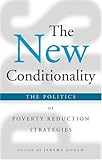| Title : | The new conditionality: the politics of poverty reduction strategies | | Material Type: | printed text | | Authors: | Jeremy Gould Editor | | Publisher: | Zed Books | | Publication Date: | 2006 | | Pagination: | 192 p. | | Size: | Paperback | | ISBN (or other code): | 9780842775233 | | Price: | gift | | Languages : | English (eng) | | Abstract: | Poverty Reduction Strategies (PRSs) are the new buzzwords in development aid. Some 70 countries have already elaborated them in response to World Bank and bilateral aid agency requirements. This book presents detailed, field-level research on the application of PRSs in three countries: Tanzania, Vietnam and Honduras It describes the changing relations between the governments of these countries, donor agencies, and civic organizations that have taken part in formulating the new generation of PRSs. Poverty Reduction Strategies run up against a central paradox: in giving decisive policymaking powers to external agencies, the very process of drawing up development strategies to prioritise reducing poverty can gravely undermine the consolidation of democratic forces, structures and ideas in developing countries. | | Curricular : | BBA/GE/MBA | | Record link: | http://libsearch.siu.ac.th/siu/opac_css/index.php?lvl=notice_display&id=20181 |
The new conditionality: the politics of poverty reduction strategies [printed text] / Jeremy Gould Editor . - London, New York : Zed Books, 2006 . - 192 p. ; Paperback. ISSN : 9780842775233 : gift Languages : English ( eng) | Abstract: | Poverty Reduction Strategies (PRSs) are the new buzzwords in development aid. Some 70 countries have already elaborated them in response to World Bank and bilateral aid agency requirements. This book presents detailed, field-level research on the application of PRSs in three countries: Tanzania, Vietnam and Honduras It describes the changing relations between the governments of these countries, donor agencies, and civic organizations that have taken part in formulating the new generation of PRSs. Poverty Reduction Strategies run up against a central paradox: in giving decisive policymaking powers to external agencies, the very process of drawing up development strategies to prioritise reducing poverty can gravely undermine the consolidation of democratic forces, structures and ideas in developing countries. | | Curricular : | BBA/GE/MBA | | Record link: | http://libsearch.siu.ac.th/siu/opac_css/index.php?lvl=notice_display&id=20181 |
|  |



